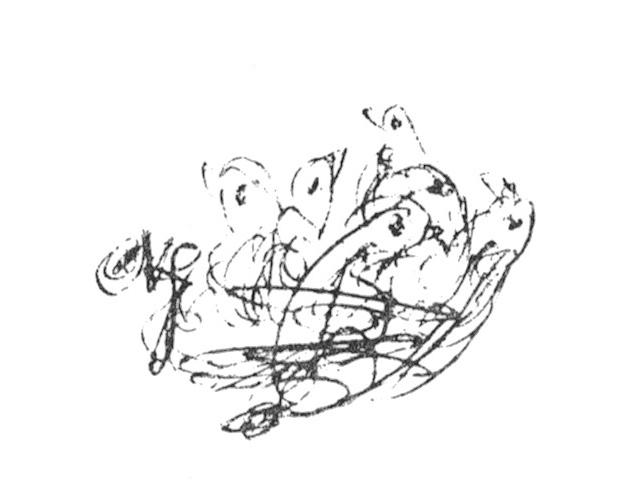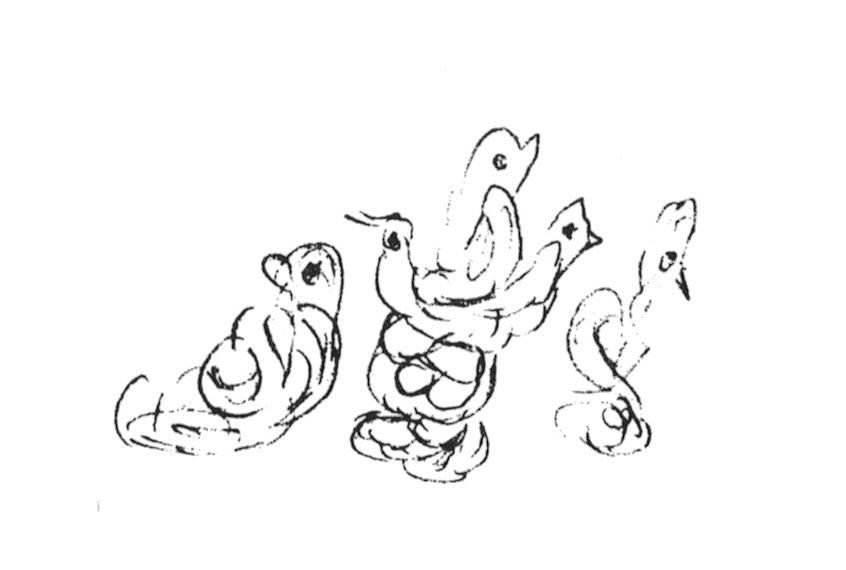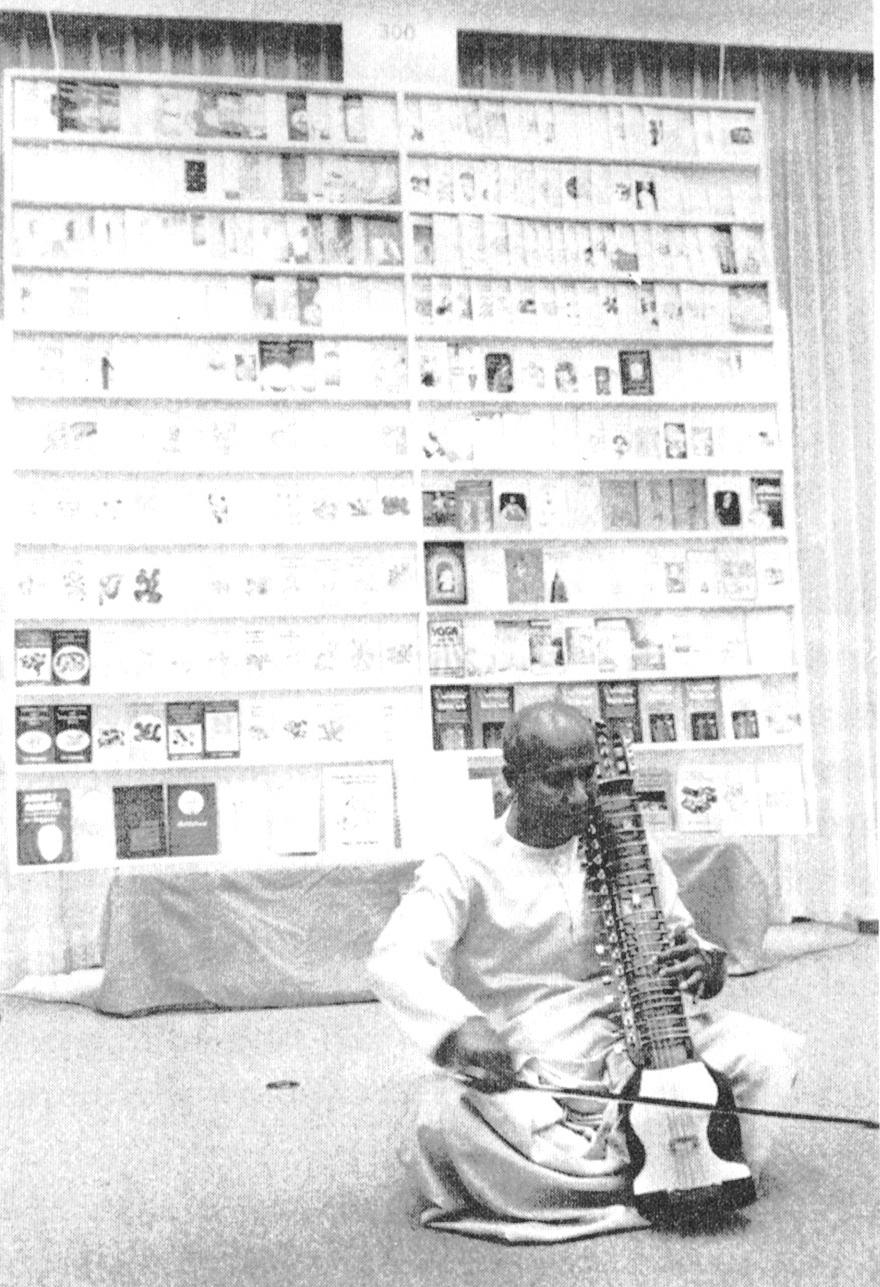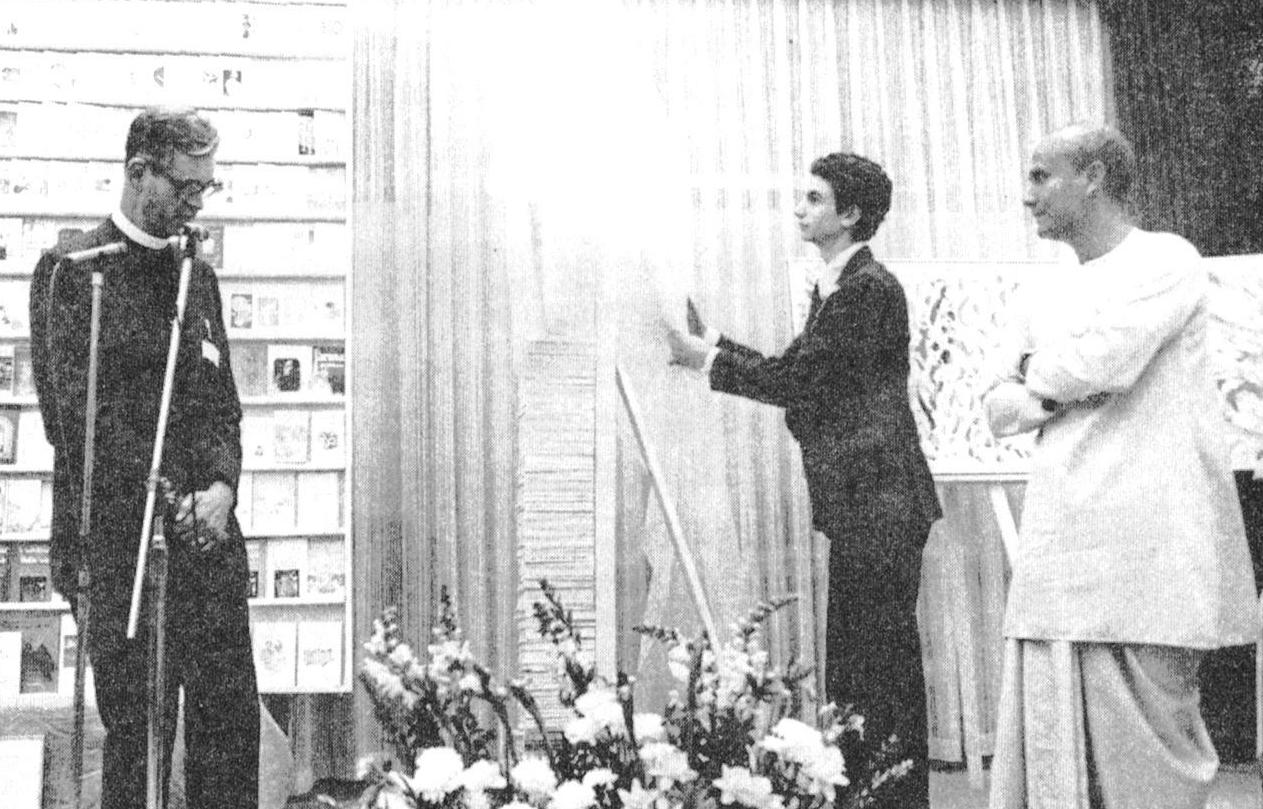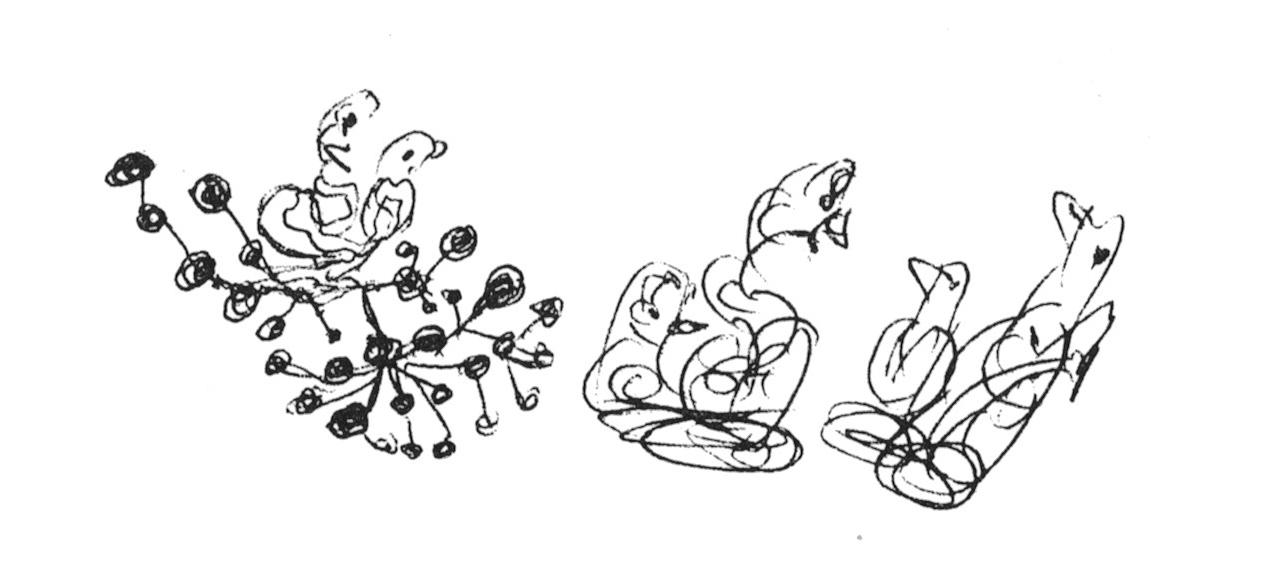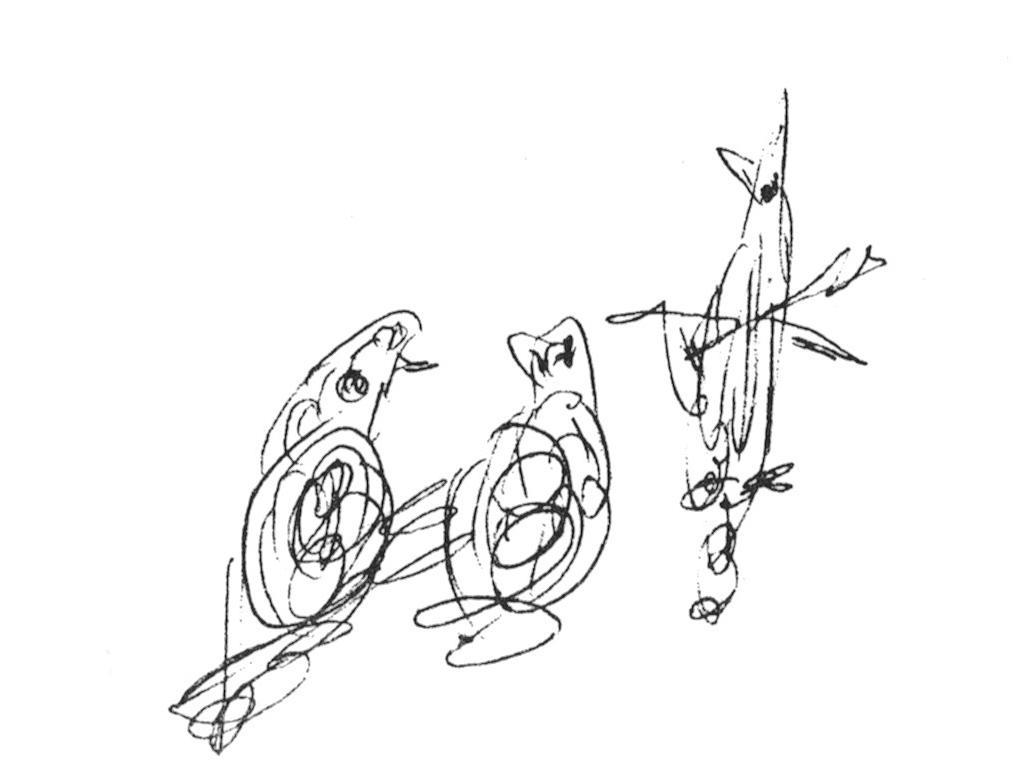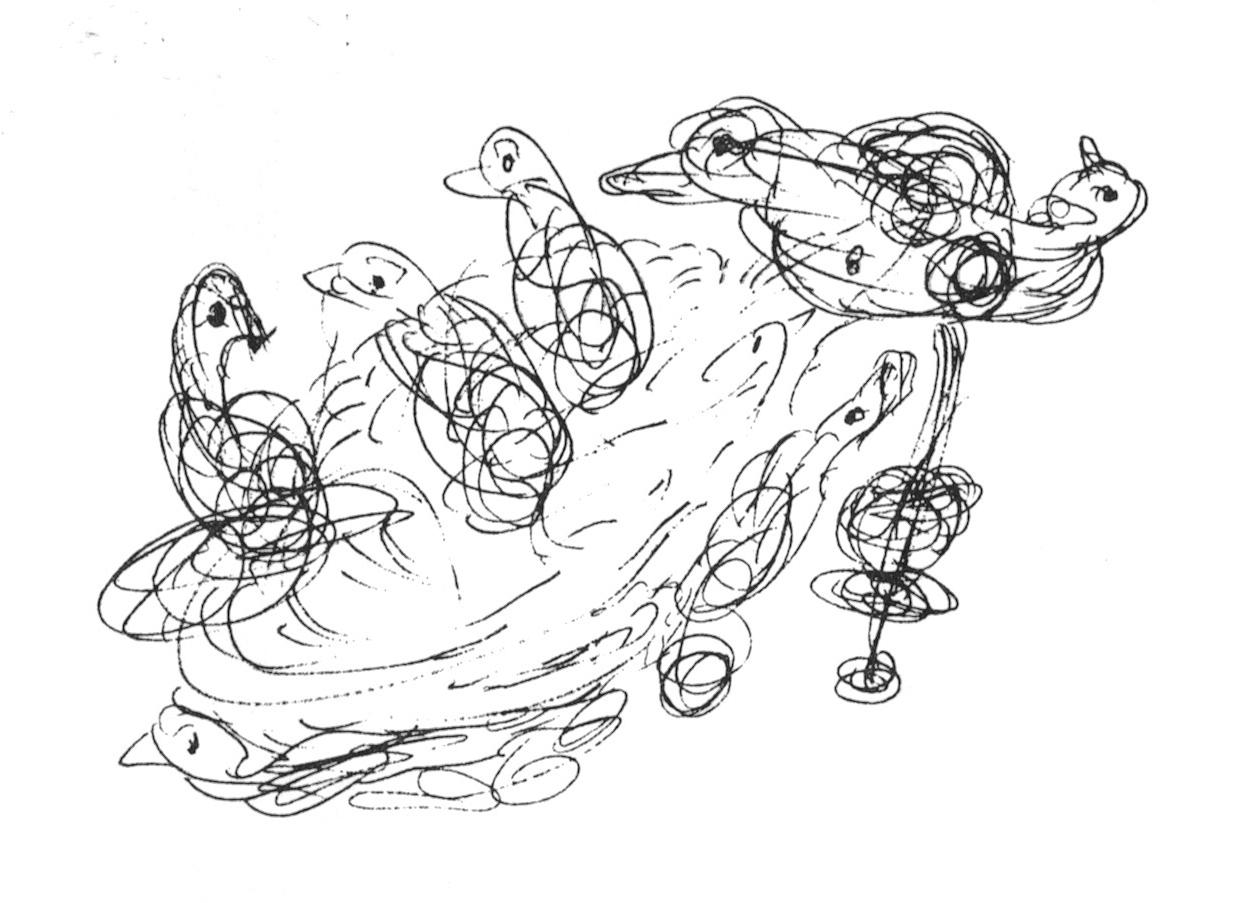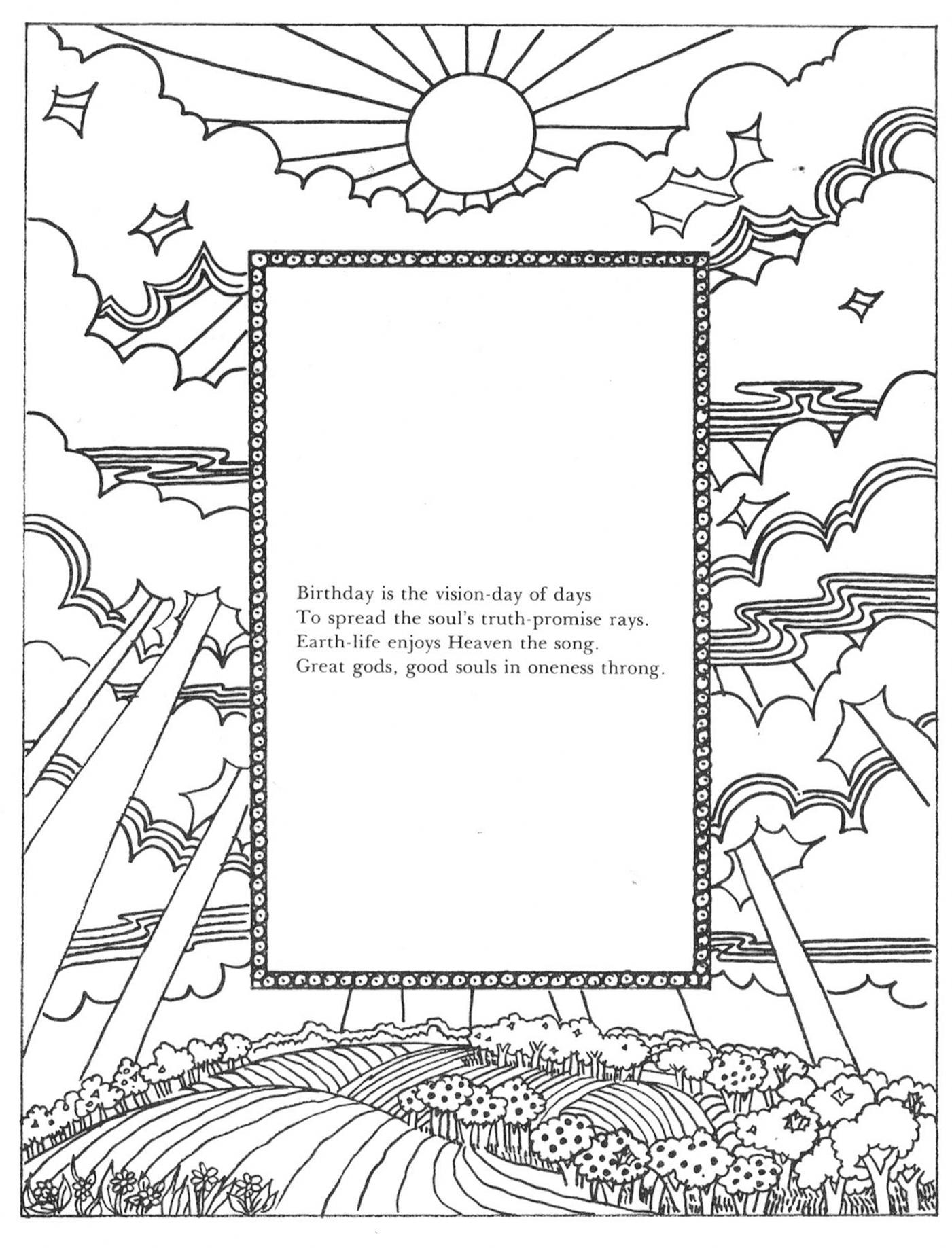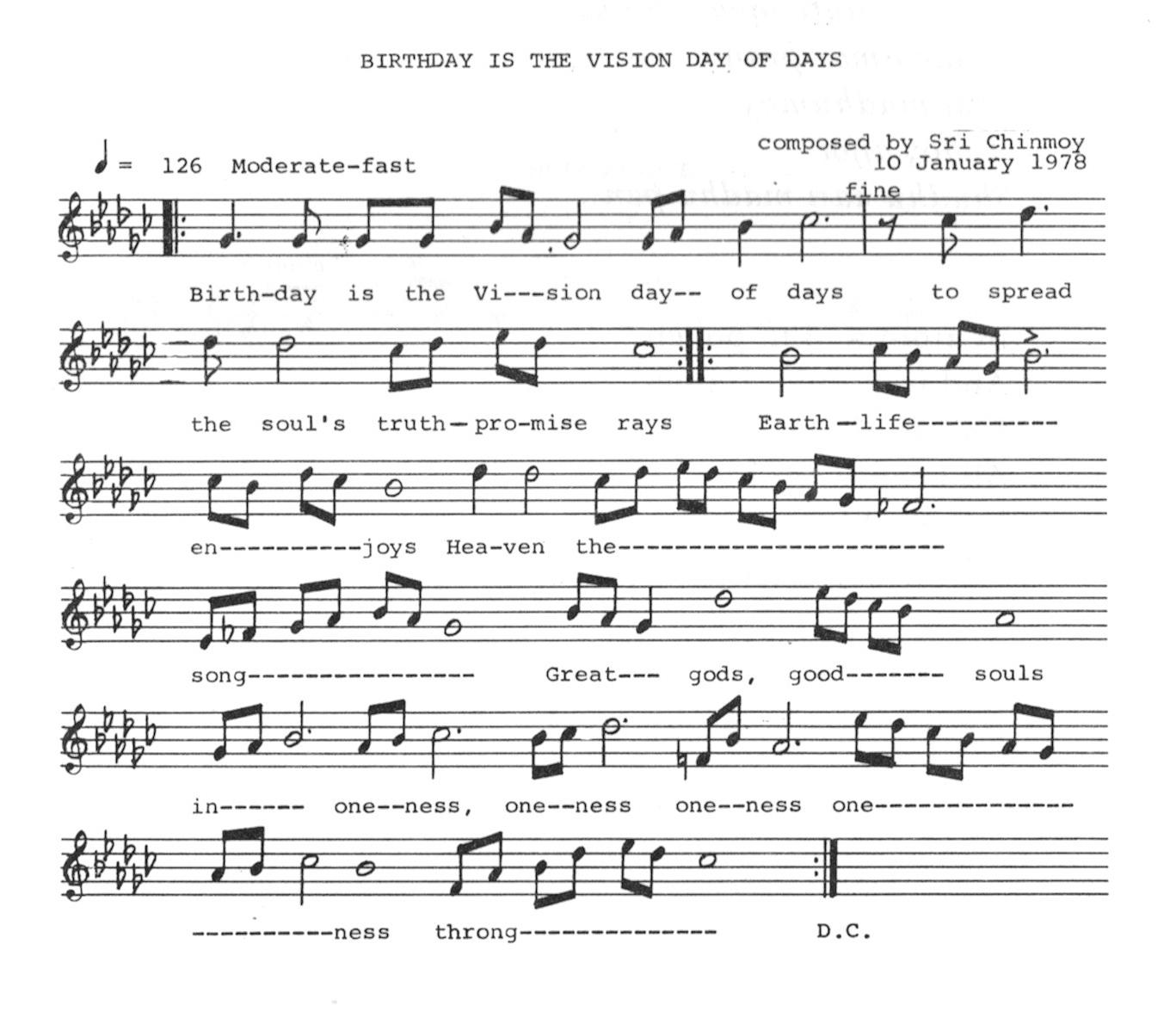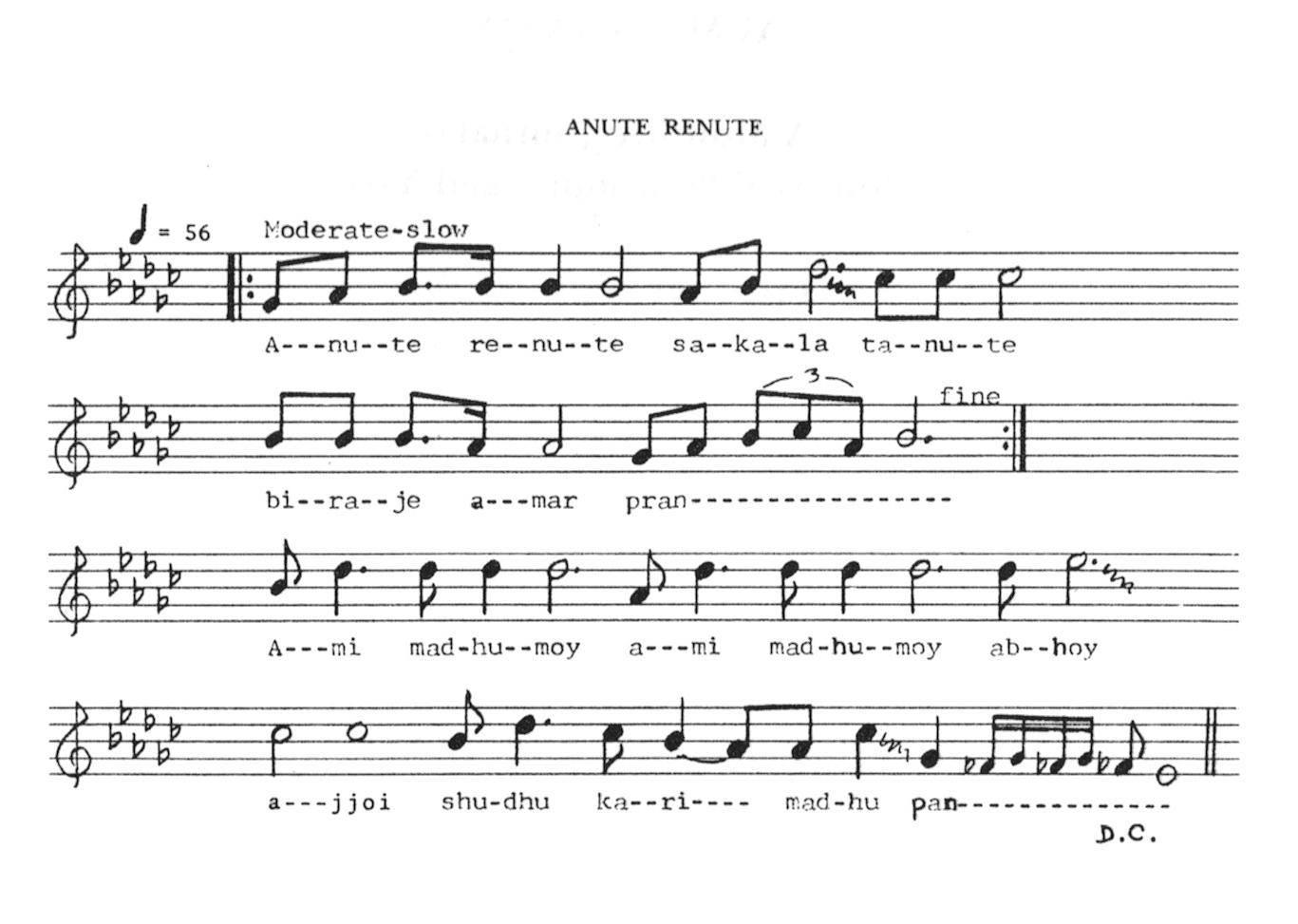AUM — Vol.II-5, No. 2, 27 February 1978
I pray1
I pray. I pray because I am hungry. I have an inner hunger for my Lord’s Compassion-flood and Satisfaction-sea.My prayer is a two-way conversation between my heart’s soulful cry and my Lord’s blessingful Smile.
My prayer is at once my assurance and my confidence. I assure my body, my vital and my mind that they are of the Supreme and for the Supreme. I offer confidence to those who are sailing in the same boat and heading towards the selfsame destined Goal as I, and yet are wanting in confidence.
Each day I renew my prayer. That means that each day I intensify and strengthen my commitment to my Beloved Supreme. It is my commitment, my sole commitment, to please Him in His own way constantly, unreservedly and unconditionally.
I pray to my Lord Supreme that I will be conscious that His Existence is constantly with me. I pray to my Lord Supreme that I will be constantly, consciously with Him. I feel that when He is with me, I am partially perfect, but when I am with Him, I am totally perfect.
My Lord Supreme, out of His infinite Bounty, has already chosen me to be His devoted and surrendered instrument. Now it is I who have to choose Him as my Eternity’s only Pilot Supreme. It is I who have to make the supreme decision of choosing Him all the time on the strength of my inner cry. When I choose God unconditionally and when I remain with God constantly, at that time I am completely perfect.
My life is a combination of unanswered prayers and unoffered prayers. When my prayers are not fulfilled, I am not sad. At that time sorrow does not torture me, for I know that my unanswered prayers are blessings in disguise. It is my unoffered prayers that pain me constantly. My unoffered prayers take me far, farther, farthest from God’s Justice-Light and Compassion-Height, while my unanswered prayers are always helping me far beyond my imagination. The divine seeker and the divine lover in me teach my unconscious body, my uncontrolled vital and my unillumined mind that my unanswered prayers are blessings in disguise, for my Beloved Supreme knows what is best for me always.
My prayers are my Lord’s Compassion-cultivation and my own satisfaction-harvest. I pray, I pray.
10 February 1978, Columbia University, New York, N. Y. Early this month, Sri Chinmoy was inspired to make a significant offering of light to the soul of each university in New York State through a concert of his music and a short inspirational talk. The following talk was given at the first concert in this series, just before Sri Chinmoy left for a visit to his family in India. The remaining concerts and lectures were arranged during his absence, to be offered in March and April.↩
Attachment-cry versus oneness-sky
Before the great spiritual Master Nigamananda was known by that name, he was called Nolini Kanto. When his wife died, he could not bear the loss, and for a while he literally became insane. Finally he went to a spiritual Master and begged him to show him his wife in the other world.The Master said with utmost affection, “My son, do not cry for things that are transitory. The body came, the body left; but the soul remains eternally. If you pray and meditate, you will see the soul of your wife everywhere. You have all along been attached to the body. Now you should be attached to the soul. When one is attached to the soul, it is not actual attachment; it is devotedness. I see that a day will come when you will give illumination to many. God wants you to be totally freed from earthly bondage. But God will not be satisfied with only your personal liberation. After you have achieved liberation, He wants you to liberate all those who will be with you, at your feet.”
Commentary: The body’s attachment-cry is always most painful. The soul’s detached oneness is always fruitful. The body knows how to cry the loneliness-cry. The soul knows how to fly in the oneness-sky.
Body's beauty fails; soul's beauty sails
In order to achieve liberation Nigamananda was practising severe austerities in Benares for quite a few months. One day he was extremely hungry, but he had nothing to eat. In silence he said to the Goddess of Plenitude, “Annapurna, how is it that I don’t get food here?”Just then a very ugly elderly woman with filthy clothes brought him a bag and said to him, “Please hold this bag of food. Let me go and bathe in the pond nearby. Then we shall eat together.”
Nigamananda waited two or three hours, but there was still no sign of her returning. Finally he opened the bag and saw most delicious food and fruits inside. He ate everything himself.
That night in a dream Nigamananda saw the goddess Annapurna. She said to him, “So you see that nobody remains hungry. I feed everyone.”
“You feed everyone?” exclaimed Nigamananda. “When did you feed me? I invoked you when I was hungry, but an ugly, dirty, old woman gave me food. You are so beautiful and luminous!”
The goddess explained, “It was I who came to you in that form.”
“Why did you do that?” he asked.
“I wanted to show you that all forms are mine,” said the goddess. “Still you care only for physical beauty and not for the soul’s beauty, so I wanted to show you that even ugly people have good hearts. From now on try to feel that physical beauty has nothing to do with a kind, sympathetic heart.”
Commentary: The beauty of the body ultimately fails. The beauty of the soul eventually sails in the Boat of Perfection-oneness towards God’s Satisfaction-Shore.
Temptation-power almost succeeds
One day while Nigamananda was practising austerities, he passed by a temple owned by an elderly woman. The woman begged the sadhu to stay in her temple for some time, and he kindly listened to her request. Finally, when she begged him to take charge of the temple, he agreed. Afterwards, both of them became very fond of each other. She showed him all her motherly affection, and he showed her all his heart’s good qualities.One day a beautiful young woman came into the temple. She became deeply enraptured with Nigamananda’s soulful beauty, and she did not want to leave the temple. Nigamananda and she had serious spiritual conversations, and he was very moved by her sincere spiritual qualities and deep spiritual understanding.
The owner of the temple did not like this at all. She felt that Nigamananda’s spirituality was being ruined. She insulted the young woman like anything in order to make her leave the temple. But the young woman had fallen desperately in love with Nigamananda, so she was adamant about staying there. And gradually Nigamananda also became weak.
Finally one day the young woman said to him, “I have amassed wealth, and I will take you to my place. I assure you, your spirituality will not be ruined. On the contrary, I shall help you to meditate all day and night. Let us get married. If we get married, then it will be natural for me to help you, and society will not criticise us. You will be able to expedite your Godward journey.” They decided to get married in two weeks’ time.
Before the two weeks had elapsed, one night in a dream Nigamananda’s Master appeared before him with a luminous face. The Master had a stick, and soon Nigamananda was shocked to see his Master striking and beating his girlfriend black and blue. The Master insulted her, beat her, and left her senseless. Then he blessed Nigamananda and said to him, “Leave this place immediately! This woman will not help you in your God-realisation, but will take away all the aspiration that you now have and turn you into a street beggar.”
Needless to say, Nigamananda obeyed his Master immediately.
Commentary: The sincere seeker has to be extremely alert all the time, for the forces of the lower vital can easily rob him. Until God-realisation dawns, he can always be tempted, and can easily swerve from the path of Truth and Light. The very nature of the outer world is temptation. In order to overcome temptation, the seeker has to be constantly vigilant, and always abide by the dictates of the inner will, not by the suggestions of the outer world.
Prayer-harvest
//[Continued from previous issue]//24.
My Lord Supreme, I am always with You. I think so, at least.
25.
My Lord Supreme, I am always for You. And I am certain.
26.
My Lord Supreme, it seems that my life’s awareness and Your Heart’s Goodness always like to live together.
27.
My Lord Supreme, Your Justice succeeds. Your Compassion succeeds too, plus proceeds.
28
My Lord Supreme, You are inviting me to journey with You. And I am all ready.
29.
My Lord Supreme, I am an unparalleled fool. I am trying to make my life valuable, forgetting that You have all along been working very hard to make my life invaluable.
30.
My Lord Supreme, am I not Yours? Am I not eternally Yours? Am I not only Yours?
31.
My Lord Supreme, I trusted You. Therefore You have shown me the heart of earth’s cry. I trust You. Therefore You will show me the soul of Heaven’s smile.
32.
My Lord Supreme, yesterday my name was hope. Today my name is frustration. Tomorrow my name will be illumination or destruction.
33.
My Lord Supreme, this world of yours has everything else except peaceful happiness.
34.
My Lord Supreme, a day of understanding and harmony is indeed Your Infinity’s Boon.
35.
My Lord Supreme,I love myself because You love me. Otherwise I do not see anything in me that deserves love either from me or from anybody else.
36.
300 books presented to Harvard University
On 5 February 1978 Sri Chinmoy presented to Harvard University 300 of the spiritual books he has written. On hand to receive the books of poetry, plays, stories, aphorisms, essays, lectures and questions and answers were Dr. Chase Peterson, Harvard’s Vice President for Alumni Affairs and Development, Dr. Krister Stendahl, Dean of the Harvard Divinity School, and Mr. Peter L. Oliver, Librarian of the Andover-Harvard Theological Library of the Harvard Divinity School. The presentation took place in Hilles Library at Radcliffe College, Harvard University, where Sri Chinmoy’s Jharna-Kala paintings were on exhibit for three weeks. On this historic occasion Sri Chinmoy symbolically offered the spiritual illumination of the East to the intellectual brilliance of the West, epitomized by Harvard, which he once called "the university unparalleled in the whole of the United States of America.”Sri Chinmoy: Dear esteemed friends, dear compassionate brothers, dear Vice President, dear Dean, dear Librarian, at our journey’s very start I wish to offer you my soulful gratitude-heart. I am sincerely happy and divinely grateful for your kind and benevolent acceptance of my humble and insignificant offering. Along with these humble creations of mine I am offering the blossoming petals of my heart’s gratitude.
I am a seeker, and all these writings are expressions of my soulful aspiration. My aspiration cried, cries and forever shall cry for the total embodiment of divinity. Today we are in a temple of divinity.
No other school, no other temple is as soulful, as meaningful and as fruitful as this divinity-flooded Divinity School.
Once more to you three, to all those who are here now and, most of all, to the loving and illumining soul of Harvard, I am offering my heart’s ever-flowing gratitude.
Dean Stendahl: Sri Chinmoy, friends, before I ask Mr. Peter Oliver of the Harvard Divinity School Library to receive these books — which will give my colleagues a feeling that they haven’t produced as much as they thought — I would like to say a few words on this occasion.
One reason this gift and this occasion are important to us at Harvard Divinity School is that historically the main tradition of that school is in the Judaeo-Christian line. And among those ten commandments that are ours in that tradition is one that says, “Thou shalt not bear false witness against thy neighbour.” Everybody knows well that there are many false witnesses brought by the West against the East — from various Western religions toward Eastern religions, and also toward the whole wisdom, insight and grasp of reality that comes out of Eastern meditation. So, while that is not the ultimate purpose, this gift of yours, Sri Chinmoy, helps us to cut down on our breaking of that commandment, because knowing something firsthand makes it easier not to tell stories about it.
The second reason is that by very happy developments, which to me seem providential, we have as part of the Divinity School at Harvard a Center for the Study of World Religions, including also the study of such an understanding of the Ultimate Reality as your paintings and your work and your insight represent. The aim of that Center has always been to take in as much as possible the total manifestations of religious traditions, both of the past and in the making. The people who worked hard in establishing that Center have very well perceived that, especially in the academic setting, one usually deals with the foundation period of religions far back; but the live and contemporary manifestations of insights are usually not part of that total picture. Your gift to Harvard Divinity School seems to me to be another and significant piece in that wonderful puzzle of the totality of human religion. Ultimately only God can hold the whole thing together.
There is also a third reason. Since I am at heart a Christian teacher, the answer must have three parts, by tradition. My third point is that as I sit in this room, as I see this Fountain-Art of yours, I feel it is beautiful and it might be the beauty of holiness. Therefore, we are very graced.
I would now very much like our Librarian, Mr. Peter Oliver, to receive this gift on behalf of the Library.
Mr. Oliver: We seldom receive this many books at one time, and have never received them all from one person’s hand. I would like to thank you very much for putting down your own journey so that others may have it and learn from it, and for presenting it to us. It is a great gift for our students who are seeking their own path.
There is a great deal in Harvard University and in the Divinity School which is open to receiving new insights, and there is also a great deal which prefers not to. But to have the presence of your own outpourings and your own understandings among us, I hope, will open the hearts of many of our students to new learning and to new understandings. I thank you very much.
Sri Chinmoy plays the esraj before a display of 300 of his spiritual books in the penthouse of Hilles Library, Radcliffe.
Dean Stendahl reflects on the significance of the meeting of East and West as Sri Chinmoy’s books are unveiled by Harvard student Steven Schecter, Co-ordinator of the presentation.
Interview with United Press International2
UPI: You said once that honesty and frankness are the birthright of the West, humility and devotion are the birthright of the East, and the combination of these four powers should be the ideal of a human being. What do you mean by this?Sri Chinmoy: When these qualities, the good qualities of the East and the good qualities of the West, are all combined, a human being can be perfect. Right now the good qualities that the East has are not enough. Similarly, the good qualities that the West has are not enough. But when we can amalgamate, when we can have the qualities of both worlds, then an individual can become perfect. Right now the West wants to proceed with only honesty and frankness, but this will be insufficient. Humility is also required. The East has humility, but honesty is also required if it wants to become perfect.
UPI: These are the kinds of thoughts that you bring to the meditation sessions at the United Nations. Do you feel that you are accomplishing something at these sessions with United Nations people?
Sri Chinmoy: Yes, I do feel that we are accomplishing something meaningful and fruitful. The delegates and staff members at the United Nations are showing more and more interest. They come to meditate, and they ask questions. Their response is most favourable.
UPI: What is it that you do at these sessions that brings favourable responses from these people? Is it just meditation and prayer, or is there something more?
Sri Chinmoy: We pray and meditate, plus I give short talks and answer their questions. The inner world embodies Peace, Light and Bliss. The outer world, unfortunately, does not right now embody these qualities, whereas the inner world has them in boundless measure. So we try to establish a free access to the inner world by virtue of our inner cry and our soulful meditation. We call this our aspiration.
UPI: So you don’t sit down and talk about the boundaries in the Middle East; you talk about other things?
Sri Chinmoy: Yes. I am quite ignorant of politics as such. My forte is spirituality. There are two approaches to every problem. One is the inner approach; the other is the outer approach. Those who come to meditate want to try to walk along the inner road. But ultimately both the roads can lead to the same destination.
UPI: The inner road — is that an evaluation of yourself, or an evaluation of other people, or an evaluation of the spiritual world? What is the inner road?
Sri Chinmoy: The inner road is the road of sincere dedication to the highest Cause. In the outer world one can aim at a particular goal without having sincere dedication to the goal. But the inner road represents the attitude of the seeker. The seeker tries in every way to lead a more illumining and more fulfilling life, to find and follow the way that is right from the highest point of view.
UPI: Are the people who come to these sessions people who really need to be there, people whose attitudes need to change and will change, or are they people who would normally come because they are good people and have been seeking the inner road already?
Sri Chinmoy: Here I must say that people come to spiritual gatherings when they have made some inner progress and they are already ready to lead a better life, a more progressive, more illumining and more fulfilling life. They have felt and seen considerable progress in their own lives, therefore they know that progress exists, and they are trying to make more progress in their day-to-day lives.
UPI: Do you have any contact with these people beyond your meditation sessions? Do you talk with them privately? Do you ever see them socially?
Sri Chinmoy: I do not see them socially. Only when they come to pray and meditate with me do I see them. But on rare occasions if they need and want me to guide them in a specific manner, if they have some special problem, I try to satisfy their inner need at some other times.
UPI: Have you ever been able to see a specific change in a person — in their attitudes or in the way they behave?
Sri Chinmoy: I have noticed considerable changes not only in individuals, but also in the United Nations as a whole. For the last seven years I have been coming to the United Nations. Now I see that people here are more sincere, more dedicated and more eager to bring about a true world-family.
UPI: You talked about your sessions containing both prayer and meditation, so that means there is a difference between prayer and meditation. What is the difference or differences?
Sri Chinmoy: Prayer and meditation ultimately lead to the same goal. Prayer is a kind of communication with God, and meditation is, too. But when we pray, we talk to a higher Authority or higher Source, which you can call God or the Force which is guiding our destiny. When we meditate, the Source or the supreme Reality talks to us. It is like the conversation that we are having now. At times I am talking, and at times you are talking. So when I pray, my message goes to God, and when I meditate, God’s Message comes to me.
UPI: So we have one-way communication with prayer, and two-way communication with meditation?
Sri Chinmoy: You might say that. When we pray, we ask the Supreme to guide us. And when we meditate, we try to receive the inner guidance from the Supreme.
UPI: Guru, what is special about your teachings, or what does your philosophy contain that is special and that man can benefit from?
Sri Chinmoy: I do not want to use the term “special,” but I can say what I stand for. I stand for divine love, divine devotion and divine surrender. I am emphasising the term “divine.” Human love you know. It eventually ends in frustration. Human devotion is nothing short of attachment. And human surrender is made under compulsion, because we are afraid that we will be punished. But divine love and devotion are pure and detached, and divine surrender is not made to somebody else. This surrender we offer to our own highest Reality. We have inside us an unillumined reality and an illumined reality. Our unillumined existence we offer to our illumined existence. We make our divine surrender to our own highest existence. The lowest existence which we now embody we try to offer to the highest, which we also embody. Unfortunately, people have not consciously realised that highest existence yet.
UPI: The meditation that you have for people who take part in your sessions, is it Yoga, or are we talking about something different?
Sri Chinmoy: It is Yoga. Yoga includes prayer and meditation and spirituality in general. So we are definitely practising Yoga. Yoga is a Sanskrit word which means conscious union with God. We achieve our conscious union with God on the strength of our prayer, meditation, aspiration and so forth.
UPI: Are you part of a particular organised religious body or a sect or cult, or are you just who you are?
Sri Chinmoy: I belong to no sect and to no religion. At the same time, my teachings embody the quintessence of all religions. I appreciate and admire all religions, but I do not belong to any particular religion. I was born as a Hindu; therefore, I know all the ins and outs of the Hindu religion. But I do not practise Hinduism. I do not follow any specific religion. My religion is to love God and to become a humble instrument of God. The Hindu religion is like a house; Christianity is another house; Judaism is another house. We can each live in a different house, and then come to one school to study. Spirituality, Yoga, is what we eventually must study.
UPI: Therefore you do accept people with different religious backgrounds into your group?
Sri Chinmoy: I do accept people belonging to various religions. No religion should be an obstacle to the study of true spirituality.
UPI: And they are not required to drop their religion?
Sri Chinmoy: On the contrary, when they pray and meditate with me they can strengthen and illumine their own religious beliefs. Previously they may not have seen any light or truth in their own religion. But once they learn to pray and meditate soulfully, they see that there is truth inside their own religion.
UPI: In the past ten or fifteen years we have seen many Gurus come to the West. Are all Gurus good?
Sri Chinmoy: Are all human beings good? There is something called comparison. Day has light, and night has darkness. But there are some people who will say that there is a little light in night, and that light is enough for them. As light is inside night, so God is inside the insincere Gurus as well as the sincere Gurus. Only He is there in a very limited measure, in an unmanifested form.
UPI: Guru, why did you come to the United States?
Sri Chinmoy: I devotedly followed an inner command from by Beloved Supreme, my Inner Pilot, to come to the United States. He commanded me to come and serve Him inside the sincere seekers in the West. The East and the West are like two houses. The father has every right to ask the son to be of service to his brothers who live in another house. For me the East and the West are not like two geographical boundaries. They are like two houses that belong to my Supreme Father. And it was He who asked me to come to the West and be of service to Him inside the seekers in the West who needed to feel more powerfully His Love, His Concern and His Blessings.
UPI: Some of the Gurus who have come to the West have gotten bad press, and they have been accused of things that you wouldn’t associate with a sincere God-server. They have got hundreds of thousands of disciples and vast amounts of wealth. I gather from what I have read about you, that you are not interested in amassing any wealth in the United States, or in getting a great number of followers. Is that true?
Sri Chinmoy: It is absolutely true. God will not ask me how many seekers I have brought to Him, He will ask me only whether I have brought the ones that I was meant to bring. He has asked me inwardly to take certain sincere ones. He has not asked me to put millions of seekers in my boat. The other thing is that He does not wish me to become a multi-millionaire. I have given hundreds of spiritual talks, and I have meditated with countless people, and I never, never accept any fee from them. I do not charge any fee, but I have written considerably and my students and disciples take care of my material needs. Money and spirituality do not go together. If money enabled people to realise God, there would be thousands of rich people on earth who had realised Him. It is only the inner wealth, which we call aspiration, which enables us to realise God. When one has the inner cry, one is bound to realise God. I care only for this inner wealth in my disciples. The outer wealth we need only in a very limited measure. We need it only to meet with our basic physical needs, not to live in the lap of luxury.
UPI: When you first arrived in the United States 13 years ago, in 1964, did you see a greater need then than you do now for your teachings? I guess I’m trying to say have you seen some changes in the way we Westerners are thinking?
Sri Chinmoy: It seems to me that the West has not only become more spiritual, but has also become wiser. When I came here in 1964 there was a strong hippie movement, and people indiscriminately flocked to the Gurus, no matter which one, no matter whether he was sincere or not. But now they have become wiser. Now they try to go deep within. They are looking for the real Gurus. They want something solid, substantial. Previously it was like a young man who wants to see the world by hook or by crook. They didn’t have enough aspiration, patience or wisdom. Now the Western world has become spiritually mature, therefore they are trying to dive deep within sincerely, steadily and purposefully. Previously the Western world was like a restless individual who wanted to acquire everything in the twinkling of an eye. Now the same person has become calm and patient. He has come to know that spiritual wealth or inner illumination cannot be achieved overnight. He has become more sincere, and has cultivated patience in his spiritual life. Since he knows that self-realisation cannot be achieved overnight, he is now walking along the path of spirituality peacefully, devotedly and steadily. This is the right approach.
UPI: So what you are saying is that maybe some of the qualities that were missing in the West are starting to take hold. Is there a need for a spiritual leader to leave the West and go to the East to teach frankness and honesty to the East?
Sri Chinmoy: The East still needs these qualities. But it is up to the Supreme to decide when the time is ripe. We call it God’s Hour. When God’s Hour strikes, I am sure the Supreme will send some spiritual figures to the East to cultivate the qualities that they badly lack. The hour has struck for the West; therefore, spiritual leaders came to the West to be of service. Similarly, the hour will strike in the East when someone will be inwardly asked or commanded to go to the East and do the needful there.
UPI: Would you accept that role?
Sri Chinmoy: Immediately. I am at His behest. If the Supreme asks me at this moment to go back to India and be of service to Him there, I will be most happy to go. As I said before, for me there is no division between East and West. And I have no personal preference. Only to follow His Will, only to abide by His Will, do I stay on earth. “Let Thy Will be done.” This is the supreme message that the Son of God offered to mankind, and every day, every hour, every minute, every second, I try only to listen to His inner dictates and execute His Will, never, never my own.
UPI: What do you require of your disciples?
Sri Chinmoy: A simple life, a sincere life and a life that feels the necessity of an inner cry. Not name and fame, but a sincere cry to become a devoted instrument of God, to please God not in one’s own way, but in God’s Way. If one really wants to please God in God’s Way, according to his inner capacity and receptivity, then I feel that he is entitled to try my path.
UPI: It is not your intention to have everyone become your disciple?
Sri Chinmoy: Far from it. That would be a mistake on my part. Suppose I am a spiritual leader and you are a spiritual leader. God wants me to have specific seekers in my boat, and God wants you to have specific seekers in your boat. If I try to grab the seekers that are meant for your boat just to have as many as possible, it will be an act of injustice. God will not be pleased with that. God wants you to have the ones that are meant for you. Ultimately you are taking them to the same Goal as I am.
UPI: Do you envision the day when your goals will be achieved?
Sri Chinmoy: In the outer world it is a very, very slow process. In the process of time, definitely, people who are following our path will reach the destined Goal. If they have a sincere cry, no sincere cry will meet with frustration, disappointment or failure. So since my students have a sincere cry, the day is bound to dawn when their sincere cry will meet with satisfaction, supreme Satisfaction, which is illumination within and without.
UPI: But you don’t ever see the day when your work will be done, do you?
Sri Chinmoy: No, my work is not like that. It is a slow and steady process. We have to sow the seed, which has to germinate, then become a sapling, and gradually become a huge banyan tree. We are now in the process of consciously becoming that which we always were in the inner world. But this process of growth is an ever-transcending process. We can grow eternally. We need never stop.
UPI: Where are you now? Have you dropped the seed? Do we have a seedling?
Sri Chinmoy: This is a most inspiring, encouraging question. I have been asked thousands and thousands of questions all over the world, but this last question of yours so far nobody has asked me, not even my disciples. We have sown the seed. Now we have a tiny plant. This tiny plant will grow and become a strong tree. If storms of doubt and hurricanes of jealousy and other undivine things enter, then naturally the progress can be very slow. But if there is implicit faith and devoted oneness, naturally the plant will very soon grow into a tree. Now we are in the plant stage; we have sown the seed, and it is no longer a seedling. It has germinated properly. Previously it was only a seedling, but now it has become a tiny but healthy plant. So there is every hope that it will weather all the buffets and blows of human doubts and weaknesses, and grow into a huge tree.
UPI: Thank you, thank you very much.
On 15 June 1977 Sri Chinmoy was interviewed at the United Nations by a reporter from the worldwide news service United Press International. Following is a transcription of that interview.↩
Silver thought-waves
//[Continued from previous issues]//Beauty
To sit at the foot of a tree is to appreciate the beauty of aspiration.To sit on the branch of a tree is to appreciate the beauty of dedication.
To see oneself as the tree itself is to become the beauty of God-expansion and the beauty of God-Height.
Consciousness
Earth-bound consciousness tells me that I am of ignorance and I am for ignorance, that my source is darkness and my journey is darkness, that at the end of my journey’s close, into darkness I shall retire.Heaven-free consciousness tells me that I am not the pilgrim, I am not the road, I am not the journey, but I am the Goal itself. This is the message that we receive from our Heaven-free consciousness.
Contemplation
Concentration is the penetration of the mind into an object or subject.Meditation is the enlargement of one’s inner being.
Contemplation is the divine enjoyment of one’s higher self.
Courage
Earth’s courage is sacrifice.Heaven’s courage is concern for earth’s transformation.
God’s Courage is to feed the past, play with the present and dance with the future in the immediacy of today. God’s Courage fulfils itself in unconditional self-giving.
Dedication
When we aspire, our dedication is unconditional self-giving to the Cause, to the Source, to the Supreme Reality.When we do not aspire, our dedication is nothing short of unrecognised attachment to an unconscious reality, to an unconscious life.
Duty
An unaspiring man has countless duties. All his duties are self-imposed.An aspiring man has only one duty, and that duty is to see the Face of God in himself and in others, and to grow into God’s own Face. This is his only God-ordained duty.
Faith
Belief tells me that I can be of God if I want to; I can claim God if I want to.Faith tells me that God has already accepted me. Whether I want to accept Him or not, He has already accepted me. God has claimed me as His very own. Whether I condescend to claim Him or not, He has already claimed me as His very own.
Faith knows that our acceptance or rejection of God will not determine God’s acceptance of us. Faith knows that it is God who does everything in and through us, not the other way around.
Forgiveness
On earth, forgiveness is a sweet experience, a necessary realisation. Forgiveness is the expansion of one’s reality-light and divinity-height.In Heaven, forgiveness is a supreme necessity. The cosmic forces at times unnecessarily lord it over us. They exercise their power on earth beyond necessity.
In God, forgiveness is the living Breath that transcends itself each time it is used.
Grace
For two reasons I need God’s Grace.I need God’s Grace to see His smiling Face.
I need God’s Grace to win the cosmic Race.
[To be continued]
Songs
Birthday is the vision-day of days3
/Sri Chinmoy:/ This song is for the psychic plane. The other song, “Happy Birthday to You,” is for the vital plane. Please sing soulfully so that you can remind your brother and sister seekers, on their birthday, of their soul’s mission on earth. This song has to be sung soulfully. “Happy Birthday,” the traditional song, we sing to enjoy being a member of the vital plane. But with this song we will enter into the heart plane, the psychic plane, to bring to the fore our inner divinity and to remind ourselves of our heavenly promise to Mother Earth and of our earthly fulfilment for Father Heaven. When we sing this song soulfully, we are really serving the soul of the birthday-seeker — serving, encouraging and fulfilling the seeker’s promise both to earth and to Heaven.So kindly sing the song soulfully whenever we celebrate someone’s birthday. You will also have your own birthday, and on your birthday others will sing soulfully for you. It will be of tremendous help if you can sing it soulfully. Learn it thoroughly and sing it soulfully. Then the soul of the seeker whose birthday it is will be extremely grateful to you. If you can sing it really well, most soulfully, then I assure you even the cosmic gods will come to bless you. When you sing “Great gods, good souls,” the great gods are the cosmic gods and the good souls are all of you. So you will be in the company of the cosmic gods and goddesses if you can sing most soulfully. While you are singing it, think only of the heart and the soul. Everybody should learn this song except those who are tone-deaf and tongue-tied.
Birthday is the vision-day of days
To spread the soul’s truth-promise rays.
Earth-life enjoys Heaven the song.
Great gods, good souls in oneness throng.
Last month Sri Chinmoy wrote a soulful song for his disciples to sing for each other on their birthdays. After teaching us the song, he gave a short explanation of its significance. This brief talk and the words and music to the song follow.↩
Anute renute sakala tanute
Anute renute sakala tanuteBiraje amar pran
Ami madhumoy
Abhoy ajjoi
Shudhu kari madhu pan
In atom and in pollen
And in human frames
My life abides.
All beauty am I,
Immutable am I.
I drink my ambrosia all alone.
